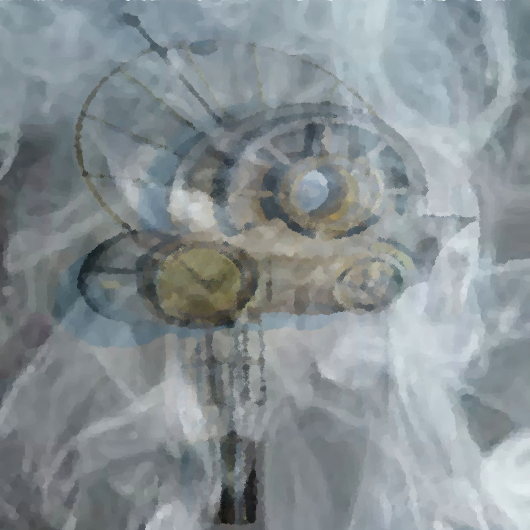When I called Anand Wilder, the lead guitarist and designated press mouthpiece for Yeasayer, he didn’t pick up, Three times. On the fourth try, he picked up after a couple of rings and quickly apologized, explaining that he was walking around Lower Manhattan and that his phone was about to die. He seemed like a nice guy, and he “avoiding getting on a subway” for the sake of the interview. Yeasayer are currently on tour in support of their next album, Fragrant World, due out August 21, but I caught up with him on a Thursday evening, when he was in Lower Manhattan, before they had left for tour. I try to keep interviews as conversational as possible, and despite being between places, he obliged my wandering questions without hesitation, going in depth and over our allotted fifteen minutes. His thoughts on Yeasayer’s genre and artistic goals, staying relevant, self-awareness and socially-conscious music all lie below.
Do you see Fragrant World as going in a new direction for you guys after Odd Blood?
Wilder: Yeah I think so. The music, the rhythms are a little bit more abstract. We allowed ourselves to experiment more, not really worrying about making the most catchy, anthemic pop songs for the Lollapalooza crowd. Just kind of making something that was more enjoyable to listen to. But, that’s not say it’s not poppy. There’s still some catchy songs. We definitely wanted it to be a little bit darker than the last record though.
Why is it that you all wanted to go in a darker, abstract direction?
Wilder: I don’t know, I think your moods change. You want to get away from whatever you’ve been doing for the last few years. Some people want to keep repeating themselves, but we’ve always kind of taken pride in shifting styles and staying current. You get excited by different new music that’s around, and you say, “Oh I want to try my hand at that.” A lot of times we’re taking a few aspects of it. Like, “Oh, I really like this instrumental band, but what would it be like if we took that and threw some vocals over it?” Maybe we like that DJ, but there’s no human element. So we throw a little guitar on that, and what does that sound like? We’re not in a bubble. We’re reacting, creating stuff that’s in conversation with our artistic peers.
Can you give me a specific example of some music where you thought, “Oh, this is something we need to respond to.”
Wilder: I think a lot of the English electronic music that’s been coming out, getting hyped up. Dubstep, brostep stuff. [Laughs] Between this album and the last one, I was really turned on by the guitar music of Delicate Steve. It made me excited about the guitar again. The guitar, I felt, seemed played out, and so I’ve explored that. I’ve been digging into old stuff to, like I’ve been listening to early Beck records. It’s incredible that Mellow Gold still stands the test of time. I like to incorporate Beck’s production music and make it contemporary.
Would you say that you all have, on past records, intentionally made music that’s really anthemic, really poppy?
Wilder: Yeah. I think a lot of it was a response to the notion that we were some kind of anti-pop music band—really into krautrock and that kind of stuff. We are into that stuff, but we thought we were writing pop songs [on All Hour Cymbals]. With hooks and choruses and sing-alongability. But there were some aspects that we were neglecting, like just having clear-sounding vocals, or a really strong, purposeful bass line. Maybe against our better instincts [on Odd Blood], I think we pushed the vocals and the beat to the fore. We had much more time mixing it; we had the right engineers that could kind of achieve that sound. Whereas the first album was a much muddier, lo-fi exercise. Although we were able to get the songs [from the first album] to that kind of anthemic level in live performance, so we wanted [with Odd Blood] something that same kind of energy as the live show. With this it one, it was, “let’s see if we can make something that someone could enjoy in their bedroom.” But still have very interesting sounds.
I was just listening to “Longevity,” and I couldn’t help but feel that you guys are still responding, artistically, to the discontent laid out right in the first line of “2080.” [“I can’t sleep when I think about the future I was born into.”] Would you say that an accurate statement or am I reaching?
Wilder: Nyeaahhh [noncommittal noise], you know we’re still the same people, so we’re gonna end up feeding the same kind of fiend in your own little rut, in your adult brain. [Laughs] There are some things that we kind of tend to hit on, but then I also think that we’ve matured and have changed the topics that we write about. But sure, there are definitely links thematically between “2080” and some of the new songs. Same band, you know?. I don’t think we’re going to start singing about really graphic sexual exploits
You’ve talked about all these bands and new sound that you guys are reacting to with this album… what is the goal in doing that for Yeasayer? What is the artistic aim, so to speak? Last question.
Wilder: I think the aim is to create culturally relevant, but also enjoyable, music. We also hoping that it remains relevant twenty-eight hundred years down the road. That’s it’s not just a trend, a little fad in our little community. We want to sustain that and keep making good music, to keeping self-aware, and also engage in all the different music that’s out there. You see a lot of older artists refuse to change. Like Jeff Beck, just playing the same shit, the most boring shit. Then you have other people who are constantly experimenting and doing weird stuff, like Paul McCartney writing an opera. I doubt if anybody ever heard that but that’s pretty great. We aspire to be constantly evolving and challenging ourselves.
Why do you think a lot of bands are interested in making music that’s both enjoyable and socially conscious in a way. Why do you think so many people are interested in exploring that tension? Sorry to ask another question.
Wilder: You know, I don’t know. I think sometimes when something is entertaining then you don’t really pay attention to the socially conscious message or whatever. The songs I really love, I don’t love because I can go, oh that’s got a great political message. In fact, most of those kind of songs I find to be kind of annoying. If someone writes a great song and there’s a good message underneath it and there’s a good melody and it’s not hitting me over the head, then I probably won’t even notice the message. But you try. I don’t know. I don’t really believe that pop music with a social message is really ever going to change anything. I’m a bit of a cynic in that way. I think it’s a lot easier to write something political under the guise of pop song than to actually go out and do anything. It would be cool if someone could summarize the protests in 2012 with some classic phrase like “Give peace a chance.” I haven’t seen anything of that caliber. That kind of protest seems a little retro.
—-
A version of this article appeared earlier this week on Pretty Much Amazing. The introduction was changed; I swear I’m not making up quotes.


Woah! I’m really digging the template/theme of this website.
It’s simple, yet effective. A lot of times it’s hard to
get that “perfect balance” between superb usability and visual appeal.
I must say that you’ve done a excellent job with this.
Also, the blog loads very fast for me on Safari. Exceptional Blog!